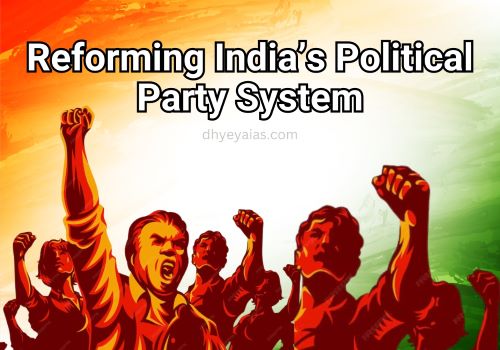Context-
In the lead-up to the 2024 general elections, the landscape of Indian politics is marked by a flurry of political defections across various states. From Bihar to Andhra Pradesh, legislators shifting allegiances have become increasingly common. However, recent adjudicatory decisions, notably in Maharashtra, cast doubt on the efficacy and relevance of India's anti-defection law. As we explore the intricacies of these developments, it becomes evident that the political party system in India requires comprehensive reform to address underlying issues of democracy, accountability, and governance.
Political Defections: A Legal Conundrum
● The Maharashtra Legislative Assembly Speaker's ruling on the split within the Nationalist Congress Party (NCP) exemplifies the complexities surrounding political defections. Despite clear instances of intra-party dissent and vertical splits within political parties, the Speaker's interpretation of legislative majority as the determinant of party legitimacy raises questions about the application of the anti-defection law.
● The Speaker's decision to recognize one faction over the other based on legislative support underscores the evolving dynamics of Indian politics. However, it also highlights the inherent ambiguity in interpreting legislative majority and its implications for party cohesion and stability.
Analysis of Legislative Proceedings
● Examining the rationale behind the Speaker's decisions reveals significant discrepancies in the interpretation and application of the law. While the anti-defection law ostensibly aims to curb opportunistic defections and uphold party discipline, recent verdicts in Maharashtra indicate a departure from its intended purpose. The Speaker's reluctance to disqualify dissenting legislators underscores broader challenges within the political party system.
● The lack of clarity in the adjudication process and the absence of consistent legal precedents contribute to the ambiguity surrounding political defections. As lawmakers grapple with the complexities of intra-party dissent, the need for transparent and accountable decision-making mechanisms becomes increasingly apparent.
The Dilemma of Intra-Party Dissent
● The Speaker's characterization of intra-party dissent as a legitimate expression of political dynamics challenges conventional notions of party cohesion and discipline. By reframing dissent as a natural feature of political evolution, the Speaker raises fundamental questions about the role and efficacy of the anti-defection law in safeguarding democratic principles.
● While dissent is inherent to democratic discourse, its implications for party integrity and governance remain a subject of intense debate. Balancing the rights of individual legislators with the imperatives of party discipline poses significant challenges for legislative bodies and adjudicating authorities alike.
Legal and Constitutional Implications
● The Speaker's interpretation of the anti-defection law raises critical legal and constitutional concerns. While the law seeks to prevent arbitrary defections and maintain political stability, its application in cases of intra-party dissent remains ambiguous. The absence of clear guidelines and precedents further complicates the adjudication process, leaving room for subjective interpretation and political maneuvering.
● The constitutional validity of the anti-defection law and its compatibility with principles of democracy and parliamentary sovereignty have been subject to judicial scrutiny. However, divergent interpretations by legislative bodies underscore the need for greater clarity and consistency in legal and constitutional discourse.
The Imperative for Inner-Party Democracy
● Underlying the debate on political defections is the broader issue of inner-party democracy and accountability. Defections often stem from dissatisfaction with the lack of democratic processes within political parties, highlighting the need for comprehensive reform. The Law Commission of India's recommendations to enhance transparency and accountability within political parties offer a promising framework for addressing these concerns.
● Ensuring robust mechanisms for internal democracy and decision-making within political parties is essential for fostering a culture of accountability and inclusivity. By empowering party members and promoting grassroots participation, political organizations can mitigate the risk of opportunistic defections and strengthen democratic institutions.
Proposals for Reform
● To address the shortcomings of the existing political party system, concerted efforts are needed to implement meaningful reforms. Mandating democratic structures within political parties, including regular elections and transparent decision-making processes, can foster a culture of accountability and inclusivity. Furthermore, empowering the Election Commission of India to enforce compliance with these reforms can enhance the integrity of the electoral process.
● Meaningful reform initiatives must prioritize the enhancement of inner-party democracy and accountability as foundational principles of democratic governance. By addressing systemic deficiencies and promoting inclusive political participation, India can uphold the values of democracy and strengthen its democratic institutions for future generations.
Conclusion
In conclusion, the need for reforming India's political party system extends beyond mere legal and constitutional considerations. It reflects a broader commitment to democracy, transparency, and good governance. As stakeholders across the political spectrum engage in dialogue and deliberation, it is incumbent upon policymakers, legislators, and civil society to seize this opportunity for meaningful change. By fostering a culture of accountability and inclusivity, India can chart a path towards a more vibrant and resilient democracy.
Through a comprehensive and nuanced approach to reform, India can reaffirm its commitment to democratic principles and pave the way for a more equitable and participatory political process. As the nation navigates the complexities of its political landscape, the imperative for reform remains steadfast, guiding us towards a brighter and more inclusive future.
|
Probable Questions for UPSC Mains Exam-
|
Source- The Hindu









